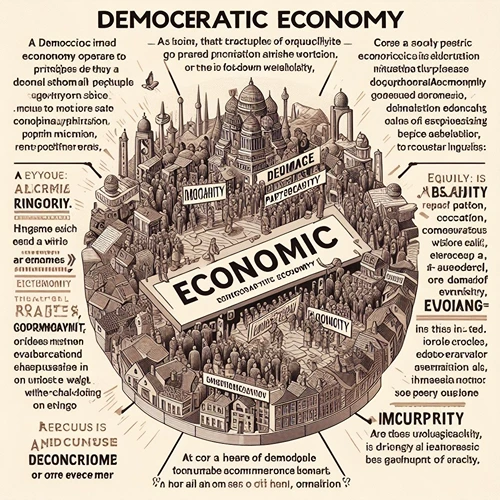Democratic economy refers to an economic system that operates with principles of equality, participation, and inclusivity. Unlike traditional economic models, which often focus solely on profit maximisation and top-down decision-making, a democratic economy emphasises broader participation, shared governance, and equitable distribution of wealth and resources among its participants.
Core Principles of a Democratic Economy:
1. Equality and Inclusivity:
At the heart of a democratic economy is the principle of equality. It aims to create a level playing field where all individuals have fair access to opportunities, resources, and economic participation, irrespective of social or economic status.
2. Participatory Decision-Making:
Unlike hierarchical structures, a democratic economy encourages participatory decision-making processes. This involves involving stakeholders, workers, consumers, and communities in the decision-making process regarding economic matters, ensuring a more inclusive and diverse range of perspectives.
3. Shared Ownership and Control:
In a democratic economy, there is a move towards shared ownership and control of enterprises. This can manifest through cooperatives, employee-owned businesses, or community-based organisations where decision-making power is distributed among stakeholders rather than concentrated in a few hands.
4. Social Responsibility and Sustainability:
Democratic economies place importance on social responsibility and sustainability. They aim not only for economic growth but also for the well-being of society and the environment, prioritising sustainable practices and ethical considerations in production and consumption.
5. Redistributive Policies:
Addressing economic inequality is a key aspect of a democratic economy. It involves implementing policies and measures that redistribute wealth and resources more equitably, ensuring a more balanced and just society.
Examples of Democratic Economic Practices:
1. Cooperatives:
Cooperative businesses operate under democratic principles where members collectively own and manage the enterprise. Decisions are made democratically, and profits are shared among members.
2. Participatory Budgeting:
In some communities, participatory budgeting allows citizens to directly decide how public funds should be allocated, enabling greater involvement in local economic decisions.
3. Worker-Owned Enterprises:
Worker-owned businesses grant employees ownership stakes and involvement in decision-making, fostering a sense of ownership and shared responsibility.
Conclusion:
A democratic economy seeks to reshape traditional economic structures by prioritising values of democracy, equality, participation, and sustainability. By emphasising inclusivity and shared decision-making, it aims to create more equitable and resilient economic systems that cater to the needs of communities, promote social justice, and foster a more balanced distribution of wealth and resources.




